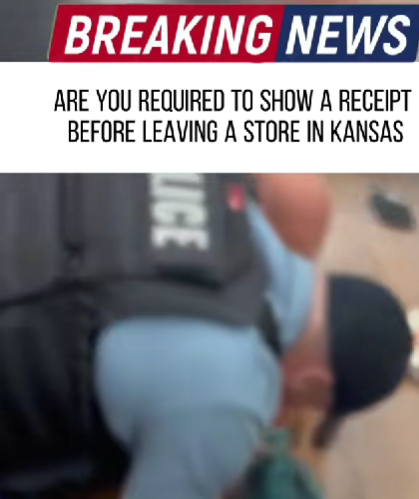A recent viral video showing a heated confrontation between a shopper and store employees in Kansas has reignited a long-debated question: Are customers legally required to show their receipts before leaving a store? The short answer — it depends on the situation, but in most cases, you’re not legally obligated to do so unless specific conditions apply.
The incident, which took place outside a large retail chain, began when a shopper refused to show their receipt to an employee checking purchases at the exit. The disagreement quickly escalated, prompting a police response. The footage has sparked widespread discussion about consumer rights, store policies, and where the line between security and personal freedom should be drawn.
According to Kansas law, there is no statewide statute requiring customers to show proof of purchase before exiting a store. However, retailers do have the right to implement their own store policies, especially in cases involving membership-based businesses such as Costco or Sam’s Club. In those stores, members agree to receipt checks as part of their membership contract — making it a condition of entry and service.
For non-membership stores like Walmart, Target, or Home Depot, things work differently. While employees may ask to see your receipt, you have the legal right to decline unless the store has probable cause to suspect theft. In other words, if you’re simply walking out after paying and not behaving suspiciously, they cannot legally detain you for refusing to show your receipt.
However, there’s an important exception: Kansas’s “shopkeeper’s privilege” law. This allows store employees or security personnel to briefly detain a person if they have reasonable suspicion of theft — but only for a short time and in a reasonable manner while waiting for police. If you’re unlawfully detained without evidence or probable cause, you may have grounds for a legal claim.
Legal experts advise that it’s best to remain calm and respectful in these situations. “While customers have rights, so do businesses,” one Kansas attorney explained. “Refusing to show a receipt isn’t a crime — but becoming confrontational can make things worse. It’s better to understand your rights and handle it calmly.”
Retail security consultants say receipt checks are primarily meant to deter theft, not to harass honest shoppers. “It’s about loss prevention,” one expert said. “Most stores don’t want to make customers uncomfortable — they just want to ensure inventory matches sales.”
Still, many consumers see the practice as an invasion of privacy. Social media users commenting on the Kansas video have voiced frustration, saying that receipt checks make law-abiding customers feel like suspects. Others argue that it’s a small inconvenience that helps reduce prices by minimizing losses.
Ultimately, the law in Kansas gives customers the upper hand — you can refuse to show your receipt unless you’ve agreed to it contractually (like in a membership store) or there’s reasonable suspicion of theft.
The takeaway: know your rights, stay calm, and remember — both you and the store have boundaries that must be respected.
